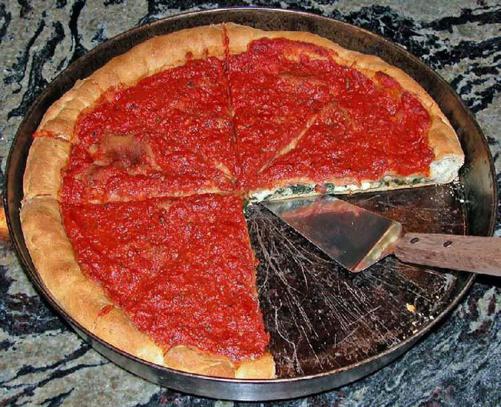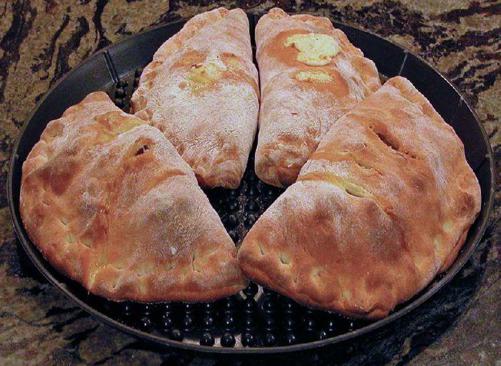Passionate About Pizza: Making Great Homemade Pizza (38 page)
Read Passionate About Pizza: Making Great Homemade Pizza Online
Authors: Curtis Ide
Tags: #Baking, #Cookbook, #Dough, #Pizza

Serving
– After removing the pizza from the oven, let it stand for a few minutes on a trivet until the sauce stops bubbling and the pizza cools slightly. This allows the toppings and cheese to set prior to cutting. Cut the pizza into manageable size slices and serve while still warm.
Take the pizza pan directly to the table, place it on a trivet, and serve the pizza directly from the pan.
Variations
Dough
– 1 1/2 recipe Basic Dough, 1 1/2 recipe Focaccia Dough, 1 1/2 recipe Half Wheat Dough, Cornmeal Dough
Sauce
– Basic Pizza Sauce, Chicago-style Sauce, Sweet Pizza Sauce, Fresh Plum Tomato Sauce, Mexican Chile Sauce, Squashed Tomato Sauce
Fillings
–
Virtually any edible cheese, vegetable, or meat. Sausage, broccoli, and pepperoni are common fillings.
Assembly and Baking
– This pizza is best when made in a pan to help keep the shape of the heavy fillings and sauce.

Pizza’s Close Relatives
The
Passionate About Pizza System
You will make great homemade pizza every time you try if you ignite your passion and follow a systematic approach to making pizza. Plan your pizza-making activities, use the same equipment and high-quality ingredients each time, use proven preparation techniques, rely on your RECIPES, and work to make continual improvements.
Recipes for Pizza’s Close Relatives
These items are in the pizza family, but are not really pizza. You can use the same dough and toppings from a pizza recipe and shape them in a different way; this gives you something clearly related to pizza. Calzones are half-moon shaped turnovers made by enclosing cheeses and toppings (therefore called fillings) inside pizza dough. Focaccia is the forerunner of the modern pizza; they usually have simpler toppings and less defined form than a pizza. Pizza bread is a pizza in the form of a loaf. Dessert pizza is for those true pizza aficionados who will not be limited to the normal strictures of main-course pizza. Bread sticks and fried pizza dough are simple forms made of leftover pizza dough. Mini pizzas are just a bite-sized or hand-sized form of pizza.
The characteristics of pizza’s close relatives are as follows (click to follow link):
Calzone
– folded dough, toppings inside, no sauce inside, individually sized
Focaccia Flatbread
– thick crust, no rim, simply shaped, usually no sauce, simple toppings
Pizza Bread
– loaf of bread, no sauce, and toppings rolled inside
Bread Sticks
– just crust, served with sauce or a meal
Dessert Pizza
– thin crust, dessert toppings
Fried Pizza Dough
– deep fried, sweet toppings
Mini Pizzas
– snack-sized, a variety of toppings
Calzone

A Calzone is like a folded over pizza. Calzones are popular all over the country, but not all pizzerias sell them. Sometimes, you can buy a Calzone in a restaurant that does not sell pizza at all. Go figure!
To make a Calzone, you fold over pizza dough to surround a filling consisting of a mixture of cheeses and other ingredients. There is usually no sauce inside the Calzone so as not to make the crust soggy. You can serve sauce on the side, if you desire. Calzones are convenient because they are more portable than pizza. A Calzone holds all the gooey stuff inside, so you can eat them with little or no muss and fuss.
You can make Calzones in any size, but they are usually single serving sized. You can make about four Calzones from the standard recipe. I have often thought that making appetizer-sized Calzone would be fun, but it has always been more effort than I have felt like doing. In addition, I have thought that it would be funny to see the look on people’s faces as I served a humongous Calzone to a bunch of dinner guests. I can imagine them thinking “How are we going to eat that thing?”
Bell Pepper and Pepperoni Calzone
Makes four Calzones.
6 ounces pepperoni, cut into small cubes
1 sweet red bell pepper, chopped into small pieces
1 sweet yellow bell pepper, chopped into small pieces
1 green pepper, chopped into small pieces
8 ounces ricotta cheese
1/2 teaspoon salt
1/4 teaspoon garlic powder
1/4 teaspoon fresh ground black pepper
8 ounces Mozzarella cheese, shredded
1 recipe Basic Pizza Dough (see recipe
page 92
)
1/4 cup lukewarm water
2 cups Basic Pizza Sauce, optional (see recipe
page 113
)
unbleached all-purpose flour (for kneading and shaping)
Filling
– Fry the pepperoni pieces for five to ten minutes at medium-low heat until crisp and slightly browned (but not burned). Drain and let cool on paper towels before using. Cut the stems out of the three peppers and remove the seeds. Cut the peppers into small pieces.
Frying the pepperoni helps take out some of its oil so that it does not ooze out from the Calzone as it bakes or as you eat it. I also tell myself that it is healthier, too.

Combine the ricotta, salt, garlic powder, and pepper together and mix until smooth. Add the Mozzarella cheese and mix until the mixture is consistent throughout. Combine the peppers, cheeses, and cooled down pepperoni together. Divide the mixture into four equal portions. If you are making more than four small Calzones or fewer big ones, divide the cheese mixture such that you have one equal portion for each Calzone you will make.
Resting
–
After the dough has risen, punch it down with one fist, take it out of the bowl, and knead it briefly, without adding any flour, to release the large air bubbles (about one minute). With a sharp knife or a dough scraper, cut the dough evenly into four pieces: one for each Calzone you plan to make. Roll each piece into a ball and place each ball between two layers of plastic wrap.
Let the dough disks rest on the work surface for five to ten minutes (up to a maximum of twenty minutes).
Shaping and Assembly
–
You roll out the dough for each Calzone into a circle using a rolling pin. After placing the filling in the middle of the circle, fold the dough over the toppings, and seal the edges. Repeat this process until you have made all the Calzones.
When you are ready to shape a Calzone, gently flatten one of the balls between the palms of your hands. Lightly dust the top side of the dough, place it on the work surface, and then lightly dust the other side of the dough. Flatten it again with the palm of your hand as much as you can. Roll the dough with a rolling pin until it is about 1/8” thick; the diameter of the circle will depend on the number of pieces into which you cut the dough. As you roll out the dough, turn it around and around to maintain a circular or slightly oval shape. Frequently turn the dough over and sprinkle and smooth on some flour to keep it from sticking to the surface.

When the dough circle has reached the desired size, place one portion of the filling towards one side of the circle leaving it about one inch from the edge. Brush the outside inch of the circle with water to help the dough adhere to itself when you fold it. Gently fold the dough over the filling so that it covers the filling and the two layers of dough line up at the edges. Pinch the edges together to seal by pushing down on the two layers into the work surface. Go over each part of the edge twice to make sure you seal it well. Put the finished Calzone on a prepared pizza peel and go to work on the next Calzone. Alternatively, you can roll out two circles of dough then assemble both Calzones at the same time.
To slash or not to slash, that is the question. When the Calzone cooks, the filling will heat up and give off steam. With the dough sealed around the filling, the Calzone to puff up with air. Unfortunately, sometimes the fillings will seep or boil out from the middle of the Calzone. If you like big, puffy Calzones do nothing. If you do not like them so puffy, you can make one or two slashes in the top of the Calzone to release the steam during cooking. I typically slash my Calzones.
Baking
– Normally, you will put one or two Calzones into the oven at a time, but you can cook up as many that will fit on your pizza peel and baking stone at the same time. Take care to place them on the baking stone such that all the Calzones fit without overlapping each other. Alternatively, you can cook them in several batches.